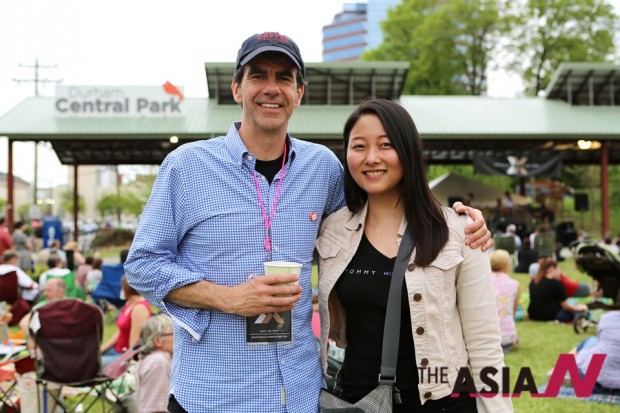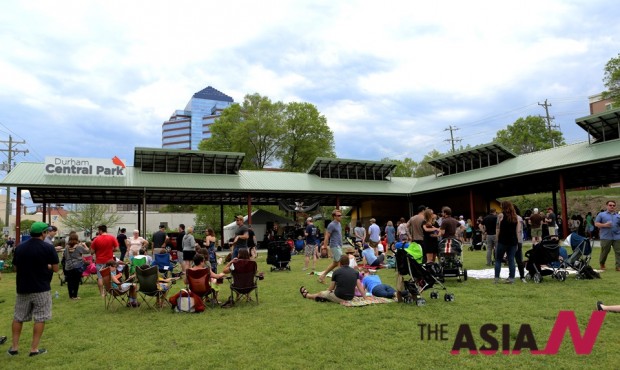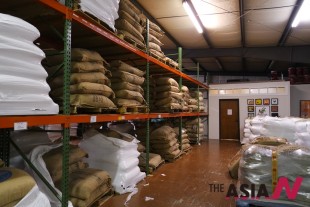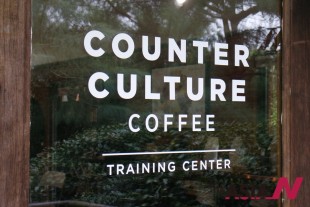Coffee, Education and Counter Culture
In 1995, Counter Culture Coffee started a rebellion against uniformity and conglomeration of coffee with brands such aa Starbucks, and has since pursued the specialty coffee for 20 years. On April 18, Counter Culture Coffee showed their value of individuality and freedom at the 20th anniversary party, held at Durham Central Park in North Carolina. Many coffee lovers from around the states gathered and enjoyed Counter Culture staffs’ freshly brewed coffee. The tasty food from local food trucks was a special gift for foodies.
Live music from great bands such as The Love Language, Mac McCaughan, Loamlands, and The Human Eyes, vitalized the party as much as the coffee. The weather was a blessing, not too cold and not too hot. Even the drizzling rain added a great mood to appreciate their great coffee. The staffs of different locations in the United States gather to celebrate their anniversary and provide great coffee to the public for free. Watching their variety of brewing skills was very entertaining. People got to taste all different coffees with different methods such as chemex, siphon, pour over, and espresso. It was interesting that nobody was bored having that many coffees. The four-hour party ended, but people could not leave the place. Finally, the staff served the last brewed coffee of the day and gave out rain checks.
Counter Culture now dominates the market, supplying their roasted coffee beans throughout the east coast of the United States. Many restaurants, bakeries and coffee lovers buy their coffee and most of them know the proper way to brew it. Why are there so many people seeking their coffee in different places? Brett Smith, the founder and president of Counter Culture Coffee, gave a great answer and shared his 20-year long coffee journey
According to the dictionary,‘counterculture’ is defined as the culture and lifestyle of those people, especially among the young, who reject or oppose the dominant values and behavior of society. Why is the company’s name Counter Culture?
One of the hardest things for us was coming up with the name. One day, Fred (Fred Houk, co-founder of CCC) walked in and he was sort of the counter culture era, sort of a hippie. “I think I have it. Counter Culture Coffee,” he said. We sat there for about 10 minutes, just thinking about it. We were scared at first that people would think ‘we are these hippies and we are going to protest in front of your restaurant if you don’t buy our coffee.’ Even so, we intentionally made the first logo, the first treatment of Counter Culture. We didn’t really appreciate at first. But, over the years, we learned to appreciate that the counter culture is a great thing. We could be different and unique, not resting what we were doing, Instead of, pushing ourselves. I’ve been asked often how we came up with the name, but most people like it. I think we got lucky there as well.
How many the original goals do you feel Counter Culture Coffee has accomplished since the foundation?
Our original goal wasn’t a certain size of the company. But, really, the goal was to build a great company. A company that we are proud of ourself was where the team (the employees) enjoy working. They are fulfilled and challenged in the good way. We also want to build a company that has a great relationship with our suppliers, and never felt it was a great idea to beat down your suppliers and get the lowest prices. It is a partnership, working together to not only help them be successful and learn from them. The best relationships are ones where we can grow together. For the last part of the goal, we wanted to have the admiration of our competitors. We will go out and fight in the market as tough competitors. But at the end of the day, we want to do so respectfully. So, it is not about being the biggest and making the most profits. In my opinion, the ultimate goal is that Counter Culture goes on without me and continues to grow much bigger than I can ever make it.
In the East, there is an expression that ‘rivers and mountains are changed every ten years,’ which means ‘ten years is an epoch.’ Can you evaluate the coffee culture in 1995 and in 2015.
When we started, there were barely any coffee shops and Starbucks had 500 locations. (Now, they have 21,000.) Our world was very different then in terms of who we are selling to. So, business has evolved in our Counter Culture, and the whole industry has evolved: Going more transparent, more direct, closer relationships with the farmers. The company itself, how does it change? Fred and I were doing everything, wearing every hat we could, making the delivery and cleaning up and doing the accounting and doing everything. So, it has been really interesting to see how the company gradually added people. Still, I think Counter Culture has not changed that much. We change the industry but you touch on the culture, I think the culture has been pretty solid from the beginning. We are focused on quality and some sustainability and education. We made the decisions early on not to do retail business. At the core, in 1995 we were about good relationships, we were about pushing each other, we were about creating a good working environment, education, bringing people out and talking about coffee. Now, we are doing this on a much larger scale.
From 1997 to 2002, coffee prices plunged globally and the coffee producing farms went through a hard time. During that time, the activities of Counter Culture Coffee gave a good impression because the company visited the coffee producers, communicated directly and paid high prices for the producers’ values. It was the starting of fair trade. If you flash back to that time, what idea did you have when you started the direct trade?
There was fair trade and direct trade. Below the cost of production is not a good place to be if you are a farmer. So, a couple of things happened. Fair trade came to make sure the farmers got a livable amount. Our motivation of direct trade was plural price. But, it is really about the transparency and the relationship. Everybody in the supply chains knew what the paid price was. There is a quality level expected. It is in the communication. It is what everybody does now. Years ago, we had to have certification; now it is common every day.
Please tell your thoughts about the conditions that good coffee should have.
Of course, it’s beyond just the quality of the cup. It is the whole supply chain. Really good coffee is part of sustainable agriculture. The farmer made the proper amount and are paid fairly for their efforts. The coffee, of course, has a wonderful flavor and quality. It comes to us and we are roasting the farmers’ coffee beans. Hopefully, we can put in a package that is environment-friendly. Then, our customers can take it out, have a brew just right amount by the right time, and have someone enjoy that cup of coffee. To me, a good coffee can enhance wherever you are. It makes the experience better.
Counter Culture Coffee has been focused on education for a long time and there are variety of programs from roasting and brewing. Please introduce the educational programs and how consumers can participate in them.
When we first started just down the street, we would bring people into the facility to taste the coffees. They would walk in, see the roaster and smell all of the roasted coffee. They sat down and tasted coffee, got some caffeine, and had an amazing experience. We wondered how do we grow to the next town over. We said, “Can we take the experience with us?” We started to realize that education and training is good and branded it Counter Intelligence (CCC’s educational program). We have training manuals, developed the whole curriculum from introductory classes to higher levels, offered some certifications. The program has become a great venue to bring people in, obviously to know about coffee, to learn about culture; for us, to work together and to learn the customers’ needs. The education has given us a great opportunity, not only to build our business but keep expanding into new directions.
Coffee is acquainted with the many food and beverage cultures around the world. Please tell about the need of coffee education to the students who are exploring food cultures.
They really should know. There is a natural tendency that people enjoy food and there is a level of curiosity. I think that learning about coffee is so multi-dimensional. For me , whenever I am with a group talking about coffee, they are all foodies. There is just a natural overlap: the agriculture, how it’s grown, how it’s processed, how it’s brewed, how it’s prepared. Anybody that prepares food is going to really enjoy coffee. Show me the food venue that doesn’t serve the coffee. Even fast-food restaurants like McDonalds’ consistently create coffee program: McCafe. They have in the last 10 years gone from coffee being an afterthought to something they really work on. They continue to improve the quality. Coffee continues to evolve in terms of consumers. They continuously look for higher quality. I think the appreciation of that helps out any food business. It is such a fun product. Anybody who enjoys cooking is creative, interested, and curious. There is a lot of opportunity to satisfy all those things from coffee.
What is your favorite coffee memory among your entire life?
I was in Rwanda and working on a project for USAID (United States Agency for International Development): PEARL (A Partnership to Enhance Agriculture in Rwanda through Linkages). Genocide occurred in 1995 and a million people were killed in 100 days. You can imagine that country was just devastated. So, the president, Paul Kagame, started to get aid from the rest of the world to rebuild Rwanda, planned to rebuild the coffee industry with focusing on quality and wanted to find roasters to create awareness. Counter Culture participated to help the project. As a part of project, I had a meeting with the president of COAPS (Center for Ocean-Atmospheric Prediction Studies). We talked to all the farmers and had an one-on-one conversation for couple of hours to discuss their concerns. During the conversation, we was sitting at the table, drinking beer and eating goat meat in a little restaurant. This is my best day of coffee. I will never forget the day.
At the end, what is the meaning of coffee in your life?
Basically, most people I know are incredibly blessed. Coffee has introduced me to people from all walks of life: eating goat and drinking beer with the coffee farmers in Rwanda, meeting coffee farmers and sharing coffee with them, getting to know about Counter Culture, getting to travel around to the United States, and visiting great restaurants in New York City and San Francisco. To me, coffee has given me amazing opportunities. At the end of the day, just having a cup of coffee is wonderful, but this is more what coffee has brought to me: people, experiences and appreciation for so much more than just the brown liquid. It is the meaning of life.
Written By Sera Park






























































Pingback: 스페셜티 열풍 브렛 스미스 ‘카운터컬처커피’ 대표 “좋은 커피는 당신을 돋보이게 한다” | 아시아엔